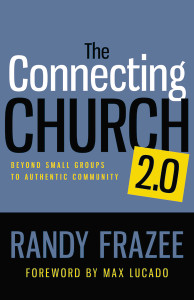 As a youth pastor for 12 years, I participated in many closed-door meetings (with men mostly 15 or more years older than me). During these meetings, I was expected to speak for millennials (who are 15 years younger than me). It is a difficult spot to be in – I would say an impossible spot. How am I supposed to speak for a new generation? Don’t get me wrong. I have studied the research. I spend time with EAs (emerging adults). I have a pretty good understanding of who they are (even though that is really not possible). I could speak for them, but why?
As a youth pastor for 12 years, I participated in many closed-door meetings (with men mostly 15 or more years older than me). During these meetings, I was expected to speak for millennials (who are 15 years younger than me). It is a difficult spot to be in – I would say an impossible spot. How am I supposed to speak for a new generation? Don’t get me wrong. I have studied the research. I spend time with EAs (emerging adults). I have a pretty good understanding of who they are (even though that is really not possible). I could speak for them, but why?
Are there not EAs who can speak for themselves?
Are there not EAs who understand their world better than me?
Are there not EAs who know how to reach their peers better than me?
Are there not EAs who would jump at the opportunity to share their voice?
Are there not EAs leaving established churches because of obstacles that keep them from what God created them to do?
So I ask again,
Are there not EA’s who can speak for themselves?
Why is it that so many churches rely on others to speak for EAs, instead of having them in the room? There is a very real, but unwritten requirement for leading within many churches – AGE. You have to be old. I have worked with many churches where the 40-year-old is considered the “youngster” on the team.
This is a problem.
![girl-woman-hair-1276336-l[1]](http://www.earesources.org/wp-content/uploads/2013/09/girl-woman-hair-1276336-l1-203x300.jpg) Many EA’s I interviewed who grew up at my church were convinced that as young adults, they were not capable of leading people who were older. I asked them why they believed this (because they didn’t learn it from me). Many had little reasoning other than younger people didn’t know enough, or that those who were older wouldn’t listen.
Many EA’s I interviewed who grew up at my church were convinced that as young adults, they were not capable of leading people who were older. I asked them why they believed this (because they didn’t learn it from me). Many had little reasoning other than younger people didn’t know enough, or that those who were older wouldn’t listen.
Is age a requirement for leading in the church? Did God ever use the young to lead? Does God require that you be a certain age before you are able to speak out? Is wisdom age-dependent?
Where did the practice of restricting younger adults from leadership begin? It didn’t start with Jesus.
If age limitations are assumed within your leadership structure, then it you should state it. Put a sign out that says, “Young Need not Apply.” I mean it. If you state it, you should be able to defend it. If you can’t defend it, then why believe it. If you don’t believe it, then stop upholding it.
Welcoming EAs into leadership will take work because many EAs feel as if…
Young Need Not Apply.






![stickyfaith-parent-edition[1]](http://www.earesources.org/wp-content/uploads/2013/09/stickyfaith-parent-edition1-205x300.png)


